Yaguang Gong
TALCS: An Open-Source Mandarin-English Code-Switching Corpus and a Speech Recognition Baseline
Jun 27, 2022


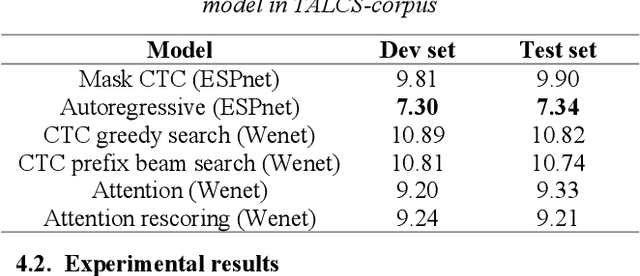
Abstract:This paper introduces a new corpus of Mandarin-English code-switching speech recognition--TALCS corpus, suitable for training and evaluating code-switching speech recognition systems. TALCS corpus is derived from real online one-to-one English teaching scenes in TAL education group, which contains roughly 587 hours of speech sampled at 16 kHz. To our best knowledge, TALCS corpus is the largest well labeled Mandarin-English code-switching open source automatic speech recognition (ASR) dataset in the world. In this paper, we will introduce the recording procedure in detail, including audio capturing devices and corpus environments. And the TALCS corpus is freely available for download under the permissive license1. Using TALCS corpus, we conduct ASR experiments in two popular speech recognition toolkits to make a baseline system, including ESPnet and Wenet. The Mixture Error Rate (MER) performance in the two speech recognition toolkits is compared in TALCS corpus. The experimental results implies that the quality of audio recordings and transcriptions are promising and the baseline system is workable.
Multi-Scale Attention Neural Network for Acoustic Echo Cancellation
May 31, 2021



Abstract:Acoustic Echo Cancellation (AEC) plays a key role in speech interaction by suppressing the echo received at microphone introduced by acoustic reverberations from loudspeakers. Since the performance of linear adaptive filter (AF) would degrade severely due to nonlinear distortions, background noises, and microphone clipping in real scenarios, deep learning has been employed for AEC for its good nonlinear modelling ability. In this paper, we constructed an end-to-end multi-scale attention neural network for AEC. Temporal convolution is first used to transform waveform into spectrogram. The spectrograms of the far-end reference and the near-end mixture are concatenated, and fed to a temporal convolution network (TCN) with stacked dilated convolution layers. Attention mechanism is performed among these representations from different layers to adaptively extract relevant features by referring to the previous hidden state in the encoder long short-term memory (LSTM) unit. The representations are weighted averaged and fed to the encoder LSTM for the near-end speech estimation. Experiments show the superiority of our method in terms of the echo return loss enhancement (ERLE) for single-talk periods and the perceptual evaluation of speech quality (PESQ) score for double-talk periods in background noise and nonlinear distortion scenarios.
Noise Classification Aided Attention-Based Neural Network for Monaural Speech Enhancement
May 31, 2021



Abstract:This paper proposes an noise type classification aided attention-based neural network approach for monaural speech enhancement. The network is constructed based on a previous work by introducing a noise classification subnetwork into the structure and taking the classification embedding into the attention mechanism for guiding the network to make better feature extraction. Specifically, to make the network an end-to-end way, an audio encoder and decoder constructed by temporal convolution is used to make transformation between waveform and spectrogram. Additionally, our model is composed of two long short term memory (LSTM) based encoders, two attention mechanism, a noise classifier and a speech mask generator. Experiments show that, compared with OM-LSA and the previous work, the proposed noise classification aided attention-based approach can achieve better performance in terms of speech quality (PESQ). More promisingly, our approach has better generalization ability to unseen noise conditions.
Multi-Scale Temporal Convolution Network for Classroom Voice Detection
May 31, 2021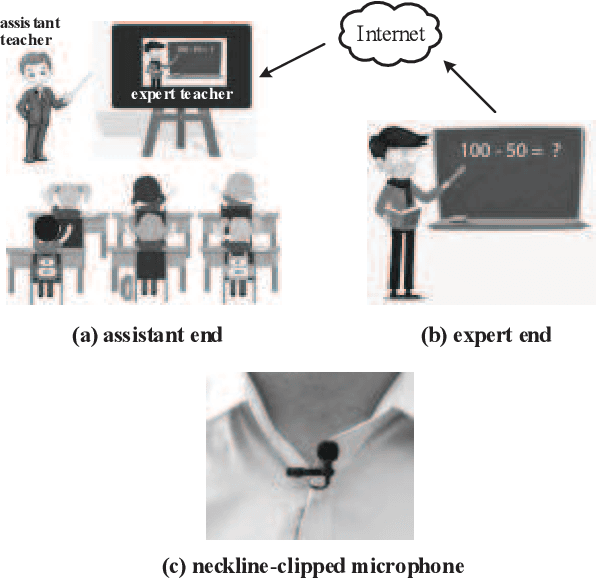
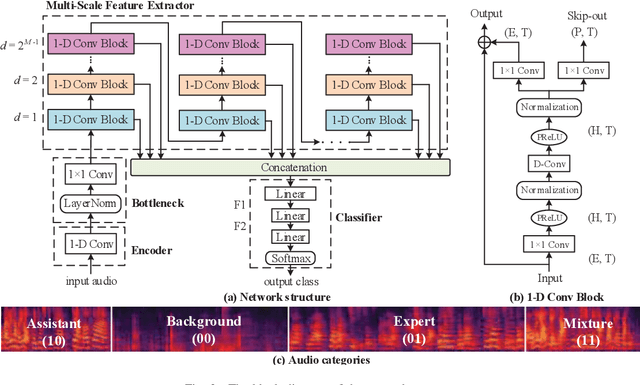
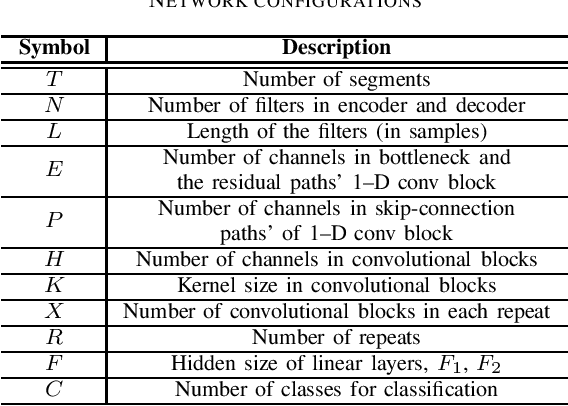
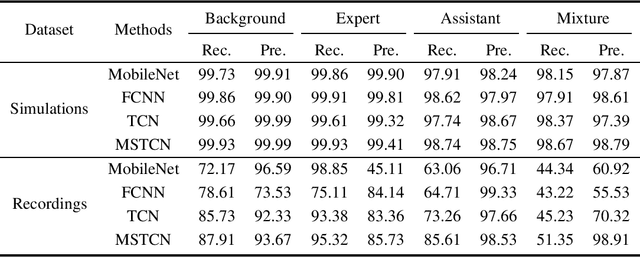
Abstract:Teaching with the cooperation of expert teacher and assistant teacher, which is the so-called "double-teachers classroom", i.e., the course is giving by the expert online and presented through projection screen at the classroom, and the teacher at the classroom performs as an assistant for guiding the students in learning, is becoming more prevalent in today's teaching method for K-12 education. For monitoring the teaching quality, a microphone clipped on the assistant's neckline is always used for voice recording, then fed to the downstream tasks of automatic speech recognition (ASR) and neural language processing (NLP). However, besides its voice, there would be some other interfering voices, including the expert's one and the student's one. Here, we propose to extract the assistant' voices from the perspective of sound event detection, i.e., the voices are classified into four categories, namely the expert, the teacher, the mixture of them, and the background. To make frame-level identification, which is important for grabbing sensitive words for the downstream tasks, a multi-scale temporal convolution neural network is constructed with stacked dilated convolutions for considering both local and global properties. These features are concatenated and fed to a classification network constructed by three linear layers. The framework is evaluated on simulated data and real-world recordings, giving considerable performance in terms of precision and recall, compared with some classical classification methods.
EchoFilter: End-to-End Neural Network for Acoustic Echo Cancellation
May 31, 2021
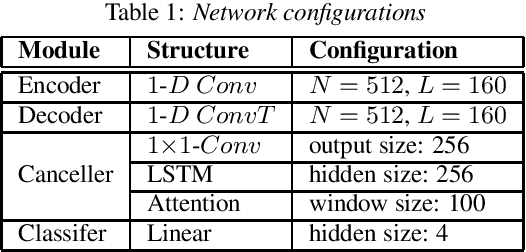
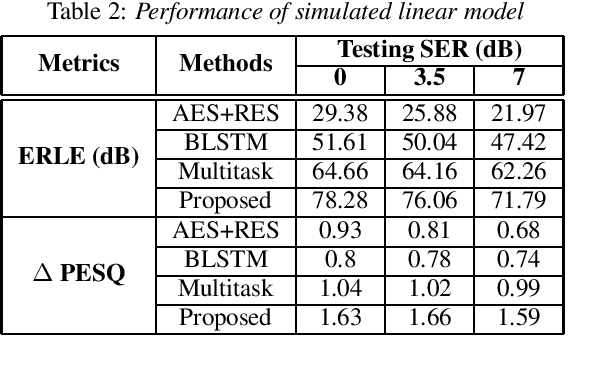

Abstract:Acoustic Echo Cancellation (AEC) whose aim is to suppress the echo originated from acoustic coupling between loudspeakers and microphones, plays a key role in voice interaction. Linear adaptive filter (AF) is always used for handling this problem. However, since there would be some severe effects in real scenarios, such nonlinear distortions, background noises, and microphone clipping, it would lead to considerable residual echo, giving poor performance in practice. In this paper, we propose an end-to-end network structure for echo cancellation, which is directly done on time-domain audio waveform. It is transformed to deep representation by temporal convolution, and modelled by Long Short-Term Memory (LSTM) for considering temporal property. Since time delay and severe reverberation may exist at the near-end with respect to the far-end, a local attention is employed for alignment. The network is trained using multitask learning by employing an auxiliary classification network for double-talk detection. Experiments show the superiority of our proposed method in terms of the echo return loss enhancement (ERLE) for single-talk periods and the perceptual evaluation of speech quality (PESQ) score for double-talk periods in background noise and nonlinear distortion scenarios.
 Add to Chrome
Add to Chrome Add to Firefox
Add to Firefox Add to Edge
Add to Edge